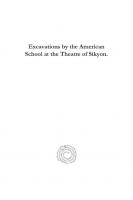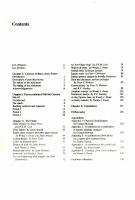Excavations by the American School at the Theatre of Sikyon. 9781607244943, 1607244942
McMurtry's original site report on the excavation of the Theater of Sikyon near Corinth. Sikyon (or Sicyon) boasts
203 63 4MB
English Pages 44 [49] Year 2019
Recommend Papers

- Author / Uploaded
- W.J. McMurtry
File loading please wait...
Citation preview
Excavations by the American School at the Theatre of Sikyon.
A n a l e c t a Gorgiana
265 Series Editor George Kiraz
Analecta Gorgiana is a collection of long essays and
short
monographs which are consistently cited by modern scholars but previously difficult to find because of their original appearance in obscure publications. Carefully selected by a team of scholars based on their relevance to modern scholarship, these essays can now be fully utili2ed by scholars and proudly owned by libraries.
Excavations by the American School at the Theatre of Sikyon.
W. J. McMurtry
l gorgias press 2009
Gorgias Press LLC, 180 Centennial Ave., Piscataway, NJ, 08854, USA www.gorgiaspress.com Copyright © 2009 by Gorgias Press LLC Originally published in All rights reserved under International and Pan-American Copyright Conventions. No part of this publication may be reproduced, stored in a retrieval system or transmitted in any form or by any means, electronic, mechanical, photocopying, recording, scanning or otherwise without the prior written permission of Gorgias Press LLC. 2009
1
ISBN 978-1-60724-494-3
ISSN 1935-6854
Extract from The American Journal ofAjrchaeology, vol. 5 (1889).
Printed in the LTnited States of America
AMERICAN J O U R N A L OF ARCHAEOLOGY. Vol. V.
SEPTEMBER, 1889.
No. 3.
P A P E R S O F T H E AMERICAN SCHOOL O F CLASSICAL STUDIES AT ATHENS. EXCAVATIONS AT T H E T H E A T R E O F SIKYON.
I. GENERAL REPORT OF THE EXCAVATIONS. [PLATES V I , V I I , I X . ]
The excavations at Sikyon by the American School were begun March 23,1886, during the directorship of Professor M. L. D'Ooge, and were continued, with some interruptions, until May 10. I n the succeeding session of the School, under the directorship of Professor A. C. Merriam, the excavations were resumed under the supervision of Mr. M. L. Earle, who will present a final report of the work done.* The choice of the site of Sikyon as a field for archaeological investigation was recommended by the fact that, in spite of the antiquity of the city and its particular importance in the history of art, no systematic excavation had ever been made there. Whether it was due to the charm of the surrounding landscape, or to a happy blending of Ionian and Dorian elements in the population, or again to the circumstances of the political history of the city, or, what is most probable, to the united action of all these causes, few cities in Hellas were more renowned as art centres than Sikyon. Sikyon first comes into view in the Homeric line, /cal Xi/cvwv, od'ap' "ASptja-To



![Excavations at the Mycenaean Cemetery at Aigion - 1967 : Rescue Excavations by the Late Ephor of Antiquities, E. Mastrokostas [1 ed.]
9781784916190](https://ebin.pub/img/200x200/excavations-at-the-mycenaean-cemetery-at-aigion-1967-rescue-excavations-by-the-late-ephor-of-antiquities-e-mastrokostas-1nbsped-9781784916190.jpg)

![Kythera: excavations and studies conducted by the University of Pennsylvania Museum and the British School at Athens [First U.S. Edition]
0815550170](https://ebin.pub/img/200x200/kythera-excavations-and-studies-conducted-by-the-university-of-pennsylvania-museum-and-the-british-school-at-athens-first-us-edition-0815550170.jpg)
![Great Tombs of the First Dynasty: Excavations at Saqqara [2]](https://ebin.pub/img/200x200/great-tombs-of-the-first-dynasty-excavations-at-saqqara-2.jpg)

![Great Tombs of the First Dynasty: Excavations at Saqqara [3]](https://ebin.pub/img/200x200/great-tombs-of-the-first-dynasty-excavations-at-saqqara-3.jpg)
